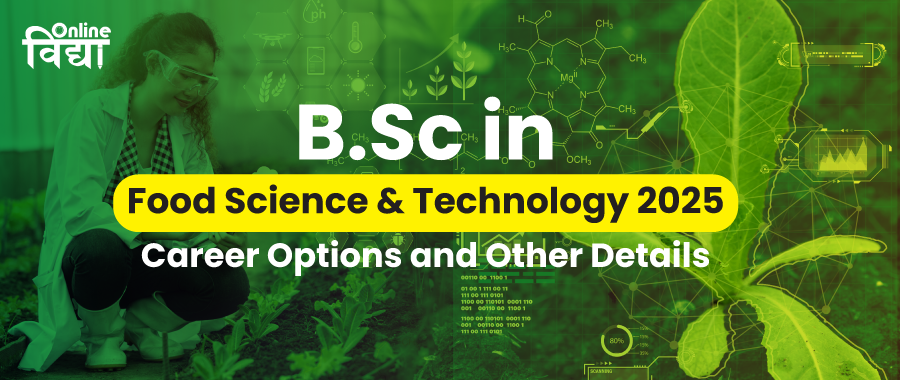Specializations
Courses Available
Courses

BSc in Food Science & Technology 2025: Career Options and Other Details
BSc in Food Science & Technology 2025: Career Options and Other Details,Dec 21, 2024
Online B.sc Program
Dec 21, 2024
4215 Views
- Share:
The Bachelor of Science in Food Science & Technology is a three-year multidisciplinary program that focuses on scientific fundamental and technological research in different areas of food channels, such as preserving, processing, manufacturing, and distributing food throughout the country or abroad with the help of communication technology or the export-import system.
Course Highlights
Particulars | Details |
Course Level | Undergraduate |
Course Duration | 3 years |
Course Accreditation | UGC, NAAC, AICTE |
Course Eligibility | 50% marks in the 12th class with PCB/ PCHome Science subjects. |
Course Fee Range | INR 20,000 to 10,00,000 Per Annum |
Course Examination Type | Semester-Based |
Course Job Profiles | Food Technologists, Food Scientists, Quality Assurance Managers, Food Safety Officers, etc. |
Average Salary Package | INR 4 to 50 Lakhs Per Annum |
Top Recruiters | Indian Agricultural Research Institute (IARI), Nestle, Britannia, Amul, Coca-Cola, Dabur, National Agricultural Cooperative Marketing Federation of India (NAFED), etc. |
Basis of the Course
- It consists of an in-depth understanding of the medical and technological components of food processing, including the nature of the food and the raw materials to be used in the production of the meals.
- This direction can assist in understanding the fundamental principles of the meals era from its production to its transportation all through the US with safety measures.
- Students additionally gain information about diverse techniques associated with the production and protection of food, including unique subjects like chemistry, physics, biology, microbiology, testing, and biotechnology.
- Students take the knowledge about dairy merchandise, cereal, confectionary products, alcohol, bakery merchandise, etc.
Basic Criteria to Take Admission
- Cass 12th certificate with 50% marks along with subjects PCB or PCHome Science as the core subjects.
- Students may have to clear some entrance examinations if your university will be hosting them for admission eligibility. Some entrance examinations for the course admission are:
- NPAT (National Test For Programs After Twelfth)
- CUET (Central Universities Entrance Test)
- CUCET (Central Universities Common Entrance Test)
- SET (State Eligibility Test)
Course Curriculum
Semester 1
| Semester 2
|
Semester 3
| Semester 4
|
Semester 5
| Semester 6
|
List of Discipline Elective Courses
Semester 5
| Semester 6
|
Course Advantages
There are numerous advantages to pursuing the BSc in Food & Technology course in the upcoming year 2025:
- Students will get opportunities in various job profiles such as Marketing Companies. Quality Assurance units, Food Manufacturing units, Food Logistics Departments, Hotel and Restaurants, Colleges and Universities, etc.
- Along with the various job recruiters companies, students get various jobs as Supervisors, quality assurance inspectors, Production managers, Food Scientists, etc as well as in the government units.
- After completing a bachelor's in food technology, students can easily study master's in food technology to upgrade their skills and knowledge.
How to prepare for the exams?
Here are some basic tips for you to prepare for the exams:
- Students need to be aware of both the syllabus and the question paper timely. Most entrance exams can go on for 2-3 hours and some can be short and consist of only objective-type questions.
- Questions are generally asked from different subjects such as Physics, Chemistry, Biology, and English and students must be thoroughly prepared in all these subjects.
- Students should study the previous year's question paper very carefully which will help to understand the types of questions answered on the exam.
Career Options
- Students graduating from Food Technology programs usually seek laboratory-based careers in clinical or technical fields that do not involve research.
- Production Managers, Food Development Managers, Food Packaging Managers, and Food Safety Auditors are some general job profiles to choose from for the students.
- The BSc Food Technology graduate can also be a food writer, writing articles for publications, journals, books, and TV shows.
The following table lists some of the most popular professional professions available to B.Sc. Food Technology graduates, along with their corresponding wages.
Job Profiles | Average Annual Wages |
Food Technologist | INR 10,00,000 |
Organic Chemist | INR 6,02,003 |
Technical Brewer | INR 6,60,236 |
Production Manager | INR 7,18,150 |
Purchasing Manager | INR 7,14,557 |
FAQs
What is the future scope of Food Technology in India?
A. The scope of the future in food technology in India is wide because India has a diverse food culture and a growing food industry.
Do I need to clear NEET to gain admission to BSc in Food Technology?
NEET (National Entrance Examination Test) is required to get admission in the top colleges of India such as AIIMS and instead of this exam there are various other exams also for students to clear are GATE, KCET, MHT CET, COMEDK UGET, TNEA, WBJEE, SRMJEEE, etc.
Which country has a high demand for food technology jobs?
Top Countries for Food Technology Graduates are: the United States, Canada, and Germany.

Meet Our Counselling Experts
Get 100% Free Career Counseling




PlacementPartners










Schedule Your 30 min Couselling Session With Today!!
Select a Date of your choice :
You Have Selected Slot on .

